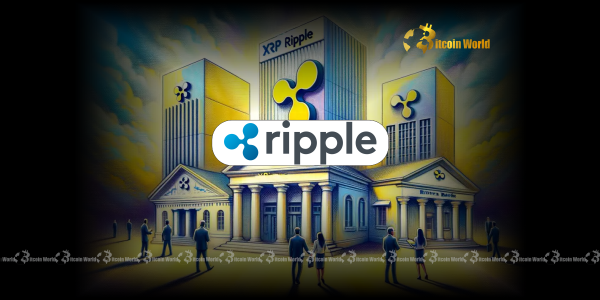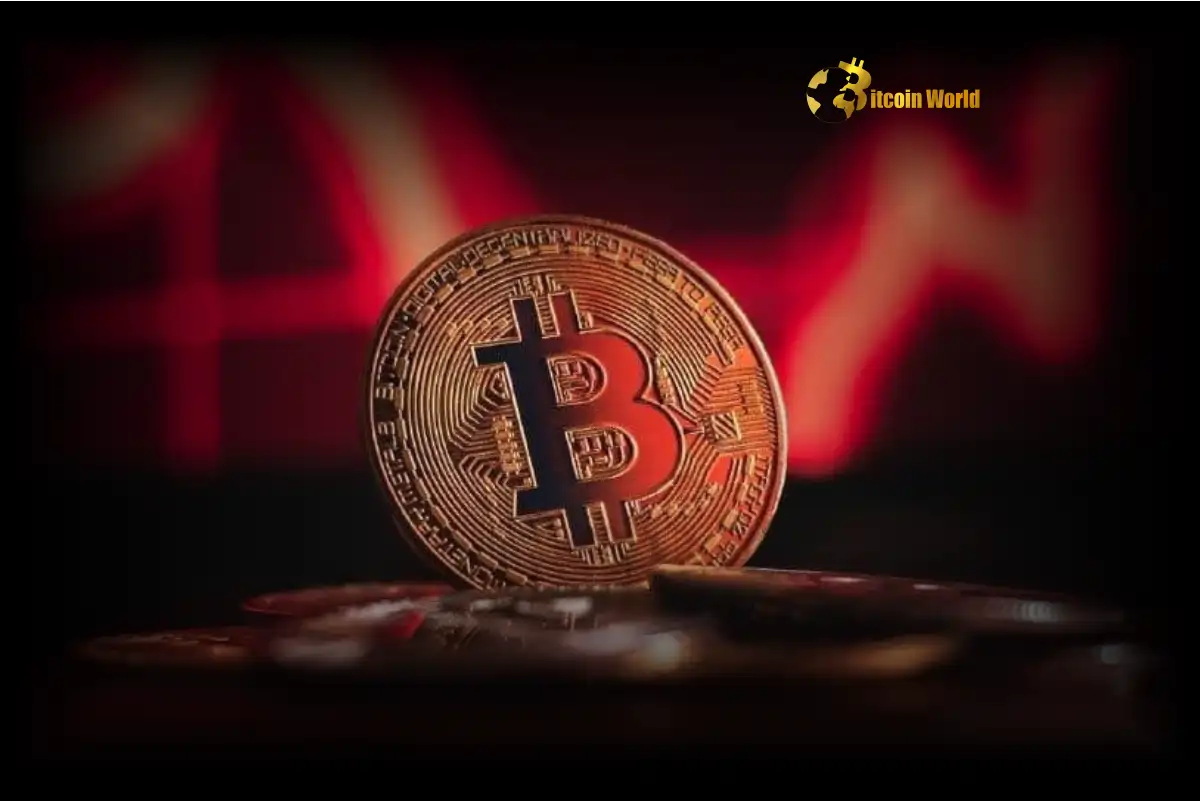BitcoinWorld

Ripple Banking License: A Groundbreaking Move for US Crypto Banking
The cryptocurrency world is abuzz with a monumental piece of news: Ripple, the company behind the XRP ledger, has reportedly applied for a banking license in the United States. This development, initially reported by Watcher.Guru on X, could be a truly transformative moment not just for Ripple and XRP, but for the entire landscape of US crypto banking. It signals a bold step towards deeper integration with traditional financial systems and a significant move to embrace formal financial services license requirements.
What Does a Ripple Banking License Truly Mean?
At its core, a banking license, often referred to as a bank charter, grants an entity the legal authority to operate as a bank. For a company like Ripple, which has historically focused on cross-border payments using its On-Demand Liquidity (ODL) product and the XRP ledger, securing such a license would unlock a myriad of new possibilities and cement its position within the regulated financial sector.
Why is a Banking License So Pivotal for Ripple?
The benefits of obtaining a bank charter are extensive, particularly for a fintech company operating in the often-unregulated crypto space. Here’s a breakdown of what it could entail for Ripple:
- Direct Access to Payment Rails: A banking license allows direct access to critical payment infrastructure like Fedwire and ACH, bypassing third-party traditional banks. This can significantly reduce costs, improve transaction speeds, and offer greater control over payment flows for Ripple’s enterprise clients.
- Enhanced Trust and Legitimacy: Operating as a regulated bank instantly confers a higher level of trust and credibility. This is crucial for attracting traditional financial institutions, corporations, and even retail customers who might be hesitant to engage with a non-regulated crypto entity. It signals a commitment to regulatory compliance and consumer protection.
- Broader Service Offerings: With a banking license, Ripple could potentially offer a wider range of financial services beyond its current cross-border payment solutions. This might include holding customer deposits, issuing loans, providing custodial services for digital assets, and even offering banking services directly to businesses.
- Reduced Reliance on Third Parties: Currently, many crypto firms rely on traditional banks for basic banking services. A license would reduce this dependency, mitigating risks associated with bank partners suddenly withdrawing services due to regulatory concerns or internal policy changes.
- Regulatory Clarity and Stability: While the application process itself is rigorous, obtaining a license provides a clear regulatory framework within which to operate. This can offer long-term stability and predictability, essential for strategic planning and growth in a volatile market.
Navigating the Labyrinth of XRP Regulation in the US
The news of Ripple’s banking license application comes amidst a complex and often contentious regulatory environment for cryptocurrencies in the United States. The most prominent example is the ongoing legal battle between Ripple and the U.S. Securities and Exchange Commission (SEC) regarding the classification of XRP. This makes Ripple’s pursuit of a banking license particularly intriguing.
How Does the SEC Lawsuit Impact This Ambition?
The SEC lawsuit, which alleges that XRP is an unregistered security, has cast a long shadow over Ripple’s operations in the US. While recent court rulings have provided some clarity, the legal saga is not fully resolved. The question arises: how can a company apply for a banking license while its core digital asset’s regulatory status is still contested?
- Separate Entities vs. Core Asset: It’s possible that the banking license application is for a specific subsidiary or a new entity that would operate distinct from the direct handling of XRP as a security. This entity might focus on other financial services where XRP is used as a bridge currency, not necessarily sold as an investment.
- Strategic Play: Applying for a license could also be a strategic move to demonstrate Ripple’s commitment to compliance and regulation, potentially strengthening its argument in the ongoing legal battle by showing its intent to operate within established financial frameworks.
- OCC’s Stance: The Office of the Comptroller of the Currency (OCC), which grants federal banking charters, has shown a willingness to engage with fintech and crypto firms. However, they also emphasize robust risk management and compliance, especially concerning money laundering and financial stability. The SEC’s classification of XRP would undoubtedly be a significant factor in their assessment.
The path to obtaining a banking license is notoriously long and arduous, requiring extensive documentation, rigorous background checks, and a clear demonstration of financial stability and robust compliance frameworks. For a company like Ripple, with its history of innovation and its ongoing legal challenges, this process will be under intense scrutiny from regulators and the public alike.
The Dawn of Digital Asset Banking: Broader Implications
Ripple’s move is not an isolated incident; it’s part of a larger trend where digital asset companies are increasingly seeking to bridge the gap between traditional finance and the crypto economy. If successful, Ripple could set a powerful precedent for other major players in the crypto space.
What Does This Mean for the Wider Crypto Industry?
The success or failure of Ripple’s banking license application will send ripples (pun intended) across the entire digital asset ecosystem:
- Legitimization of Crypto: A major crypto company securing a banking license would be a huge step towards legitimizing digital assets in the eyes of mainstream finance and the general public. It would signal that crypto is maturing and becoming a reliable part of the global financial system.
- Increased Institutional Adoption: Banks and financial institutions are often hesitant to engage with crypto due to regulatory uncertainty. If a company like Ripple can operate as a regulated bank, it could pave the way for more traditional players to enter the digital asset space, fostering greater institutional adoption of cryptocurrencies.
- Push for Regulatory Clarity: This move could accelerate the need for clearer and more comprehensive federal regulations for digital assets in the US. As more companies seek to operate within traditional financial structures, regulators will be compelled to provide definitive guidelines.
- Innovation in Financial Services: A licensed Ripple could combine the efficiency and speed of blockchain technology with the trust and security of traditional banking. This could lead to innovative financial products and services that leverage the best of both worlds, potentially disrupting traditional banking models.
This development underscores a growing understanding that for cryptocurrencies to achieve their full potential, they must integrate seamlessly with existing financial infrastructures, rather than operating in isolation. The pursuit of a financial services license by crypto firms highlights a maturation of the industry, moving beyond speculative trading to providing core financial services.
Actionable Insights: What to Watch For Next
For investors, industry watchers, and anyone interested in the future of finance, Ripple’s banking license application is a story to follow closely. Here are some key aspects to monitor:
- Regulatory Response: The reactions and requirements from the OCC, the Federal Reserve, and other relevant bodies will be crucial. Their feedback will indicate the feasibility and potential timeline for such an approval.
- Legal Developments: The ongoing SEC lawsuit will remain a significant factor. Any definitive ruling on XRP’s status could either streamline or complicate the banking license process.
- Market Reaction: While immediate price movements for XRP might be speculative, the long-term implications of a successful license approval could be profound for its utility and adoption.
- Competitor Moves: Observe how other major crypto players react. Will they follow suit in seeking similar licenses, or will they pursue different strategies for regulatory integration?
This application is not just about Ripple; it’s about setting a precedent for how digital assets will be integrated into the mainstream financial system. It challenges the existing paradigms and forces regulators to adapt to the rapidly evolving technological landscape.
Conclusion: A New Era for US Crypto Banking?
Ripple’s reported application for a US banking license represents a monumental step towards legitimizing and integrating digital assets into the traditional financial system. It’s a clear signal of Ripple’s long-term vision to become a foundational pillar of global finance, not just a disruptor. While the road ahead is undoubtedly long and fraught with regulatory complexities, including the ongoing challenges related to XRP regulation, the potential rewards are immense.
This move could usher in a new era of digital asset banking, offering unprecedented levels of trust, efficiency, and innovation. It forces a critical conversation about how traditional financial frameworks can adapt to blockchain technology, ultimately benefiting consumers and businesses worldwide. The outcome of this application will undoubtedly shape the future trajectory of cryptocurrencies and their role in the global economy.
To learn more about the latest crypto market trends, explore our article on key developments shaping digital asset banking institutional adoption.
This post Ripple Banking License: A Groundbreaking Move for US Crypto Banking first appeared on BitcoinWorld and is written by Editorial Team





